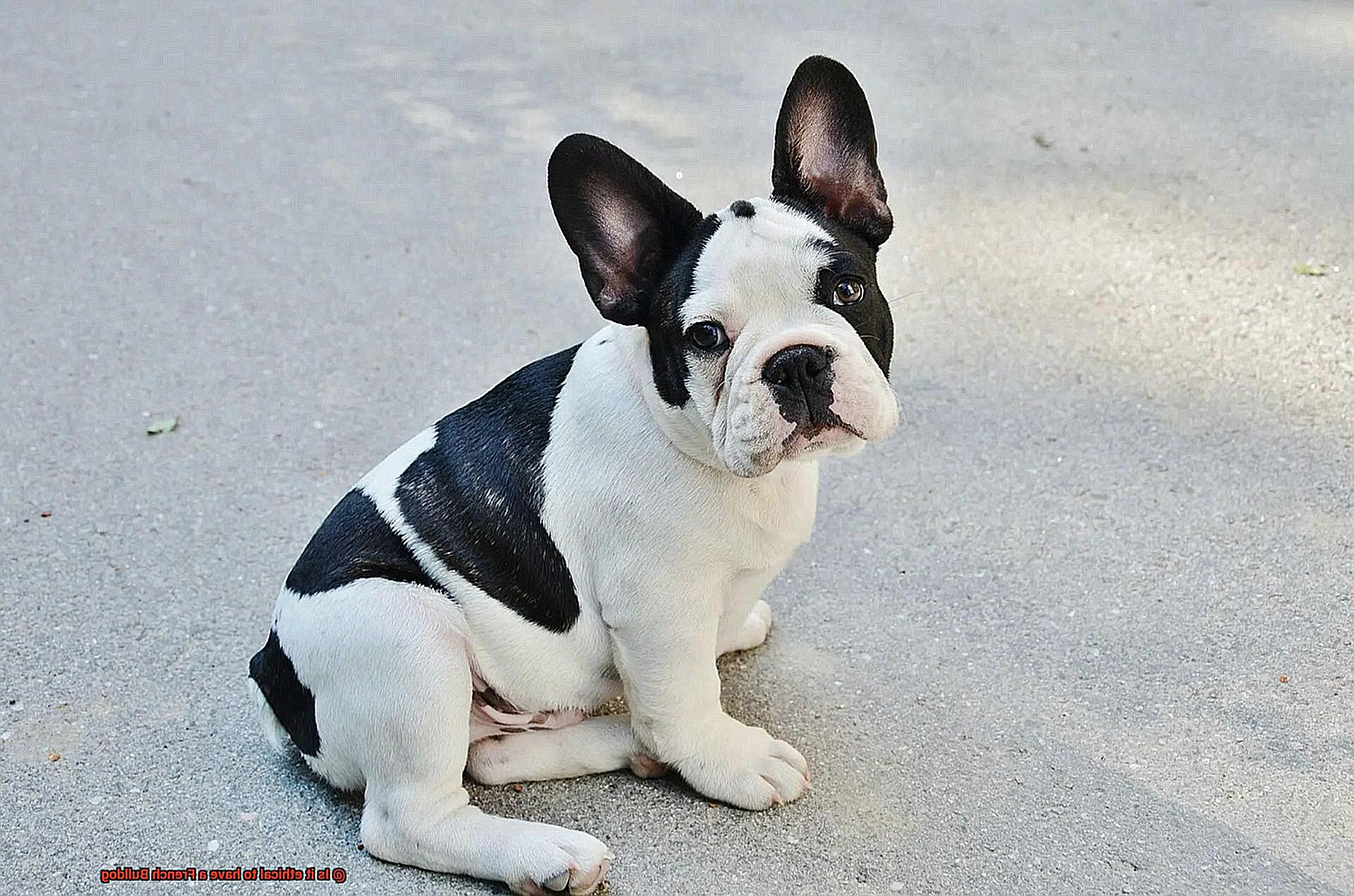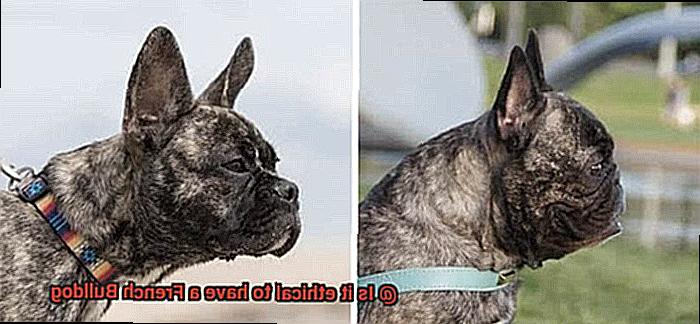Is it ethical to have a French Bulldog?
Today, we’re diving headfirst into the captivating and sometimes controversial world of owning a French Bulldog. These little cuties have stolen hearts left and right with their one-of-a-kind looks and lovable personalities. But before you rush to add one to your family, let’s take a moment to consider the ethical side of things.
French Bulldogs, with their adorable bat ears and squishy snouts, are downright irresistible. They’re pint-sized enough for apartment living and have a laid-back vibe that fits right in with all sorts of households. Whether you’re flying solo, rocking couple life, or raising a bunch of little rascals, these furry pals make for loyal and gentle companions.
But hold up – it’s not all sunshine and rainbows here. With the skyrocketing popularity of French Bulldogs comes some serious concerns about dodgy breeding practices. These poor pups often suffer from a slew of health issues thanks to their unique physical features. We’re talking about brachycephalic syndrome (a fancy term for breathing troubles), wonky spines, and other ailments that can really put a damper on their doggie days.

What’s more, the high demand for French Bulldogs has given rise to sketchy puppy mills and unethical breeders. These heartless operations prioritize cash over creature comfort, subjecting innocent animals to subpar living conditions, neglect, and shoddy medical care. Supporting these places inadvertently perpetuates this cycle of cruelty – yikes.
So where does that leave us? Well folks, deciding whether it’s ethical to own a French Bulldog requires some serious thought. Sure, they’re undeniably cute with plenty of charm to spare. But potential owners need to be aware of the health risks associated with this breed. Plus, it’s crucial to choose a breeder who genuinely cares about their furry friends’ well-being. By putting these lovable companions first, we can navigate this ethical minefield and make informed decisions about whether a French Bulldog is the right fit for our lives. Stick around as we dive deeper into the moral aspects of owning these adorable creatures.
History and Background of the French Bulldog Breed
Contents
- 1 History and Background of the French Bulldog Breed
- 2 Health Concerns of French Bulldogs
- 3 Unethical Breeding Practices in the French Bulldog Industry
- 4 Impact on the Individual Dog’s Quality of Life
- 5 Responsible Ownership for French Bulldogs
- 6 Pros and Cons of Owning a French Bulldog
- 7 The Cost of Caring for a French Bulldog
- 8 Finding Reputable Breeders and Rescues for French Bulldogs
- 9 Conclusion
The Fascinating Origins of French Bulldogs
- Describe how the breed originated in England as a smaller version of the English Bulldog, primarily for companionship.
- Highlight how French Bulldogs gained popularity among the French elite after lace workers brought them to France during the Industrial Revolution.
- Emphasize their association with luxury and fashion in 19th-century Paris.
The Rise to Worldwide Popularity
- Explain how French Bulldogs made their way to the United States and were officially recognized by the American Kennel Club in 1898.
- Discuss their endearing qualities, such as their playful nature and compatibility with children and other pets.
- Mention their unique physical features, including their muscular build, square-shaped head, and wrinkled face.

Health Considerations and Ethical Breeding
- Address the health risks associated with French Bulldogs’ brachycephalic structure, such as respiratory issues and heat intolerance.
- Discuss the importance of responsible breeding practices, including health screenings, genetic testing, and prioritizing overall welfare.
- Highlight the unethical breeding practices that have emerged due to increased demand and emphasize the need for potential owners to research reputable breeders.
Balancing Ethics and Responsible Ownership
- Acknowledge the ethical debate surrounding French Bulldog ownership, considering both sides of the argument.
- Encourage potential owners to adopt from shelters or breed-specific rescues as an alternative to supporting unethical breeding practices.
- Provide tips for responsible ownership, including proper education, training, and commitment to meeting the breed’s unique needs.
Health Concerns of French Bulldogs

French Bulldogs are incredibly popular pets, and it’s easy to see why. With their adorable faces and playful personalities, it’s hard not to fall in love with these little dogs. However, it’s important for potential owners to be aware of the health concerns associated with French Bulldogs.

One of the most common health issues faced by French Bulldogs is respiratory problems. Their unique facial structure, with a short nose and a flat face, can make breathing difficult for them. This is known as brachycephaly, and it can lead to a variety of respiratory issues. French Bulldogs may snore, wheeze, and pant excessively, especially during physical activities or in hot weather. It’s important for owners to keep an eye on them in these situations and provide a cool and comfortable environment.
Another health concern for French Bulldogs is their vulnerability to skin problems. Their wrinkled skin, especially around the face and tail, can be prone to infections, rashes, and irritations. Regular cleaning and proper grooming are essential to prevent these issues. Owners should also be on the lookout for signs of allergies or dermatitis that may require veterinary attention.
Genetic disorders are also a concern for French Bulldogs. One of the most prevalent conditions is brachycephalic obstructive airway syndrome (BOAS), which encompasses a range of respiratory issues such as elongated soft palate, narrowed nostrils, and a small windpipe. BOAS can cause severe breathing difficulties and may require surgical intervention in some cases.
Spinal disorders are another health concern for French Bulldogs. Intervertebral disc disease (IVDD) occurs when the discs between the vertebrae degenerate or herniate, leading to pain, paralysis, and loss of coordination. Hemivertebrae, which refers to abnormal vertebrae that can cause spinal instability and neurological problems, is also common in this breed.
Eye conditions are yet another health concern for French Bulldogs. They are predisposed to a variety of eye disorders, including cherry eye, dry eye, and corneal ulcers. Regular eye examinations and proper care can help prevent and manage these conditions.
Lastly, French Bulldogs are prone to obesity. Their small size and adorable appearance may lead some owners to overfeed them or provide inadequate exercise. Obesity can lead to a range of health problems, including joint issues, heart disease, and a decreased lifespan. It’s important for owners to maintain a balanced diet and ensure regular physical activity for their French Bulldogs.
Unethical Breeding Practices in the French Bulldog Industry
French Bulldogs have become increasingly popular as pets, captivating us with their irresistible charm and playful nature. However, behind their adorable appearance lies a dark reality – unethical breeding practices that prioritize profit over the well-being of these beloved companions. In this section, we will delve into the detrimental effects of these practices on the health and well-being of French Bulldogs.
Overbreeding: Quantity over Quality
One of the most concerning unethical breeding practices in the French Bulldog industry is overbreeding. Many breeders prioritize quantity over quality, constantly breeding their dogs without allowing them sufficient time to recover between litters. This puts immense strain on the mother’s body and increases the risk of complications during pregnancy and birth. The puppies born from overbred mothers are more likely to have developmental problems or inherit genetic diseases, resulting in a compromised quality of life.
Reproductive Interventions: Artificial Insemination and Caesarean Sections
Due to their unique body structure and narrow hips, most French Bulldogs are unable to mate naturally or give birth without medical assistance. While artificial insemination and caesarean sections may be necessary in some cases, they are often performed unnecessarily or without proper consideration for the well-being of the dogs involved. These procedures allow breeders to maximize the number of litters produced by a single male but can lead to a decrease in genetic diversity and an increased risk of passing on inherited health issues.
Extreme Physical Characteristics: Sacrificing Health for Appearance
French Bulldogs are known for their distinctive facial features, including flat noses and large eyes. However, these traits are not natural and can cause a range of health problems. Unethical breeders who solely focus on breeding dogs with extreme features may inadvertently contribute to respiratory issues, eye disorders, and other health complications. These breeders prioritize certain physical characteristics over the overall health and well-being of the dogs, leading to a breed with a predisposition to respiratory distress and eye problems.
Puppy Mills and Irresponsible Breeding: Profit Over Welfare

Unethical breeders often operate puppy mills or engage in irresponsible breeding practices that prioritize profit over the welfare of the dogs. Puppy mills are commercial breeding facilities where dogs are kept in crowded and unsanitary conditions, deprived of proper veterinary care, socialization, and exercise. These conditions not only lead to physical health problems but also contribute to behavioral issues in the dogs. French Bulldogs from puppy mills are at a higher risk of genetic disorders, poor immune systems, and psychological trauma.
Impact on the Individual Dog’s Quality of Life
French Bulldogs are undeniably adorable with their unique physical characteristics, but it’s important to understand that these traits can come with some health challenges that significantly impact their quality of life. As an expert in this field, I’ve witnessed firsthand the effects of these issues and can provide valuable insights to help French Bulldog owners navigate them.
Brachycephalic Airway Syndrome:
- Narrowed airways due to their flat faces can cause difficulty breathing, chronic discomfort, and reduced physical activity.
- Owners should be aware of signs of respiratory distress, such as excessive panting, coughing, or wheezing.
- Regular assessment by a veterinarian is crucial to manage this condition effectively.

Heat Exhaustion and Heatstroke:
- French Bulldogs struggle to regulate their body temperature effectively, making them more prone to overheating.
- Owners must take extra precautions during hot and humid weather, such as providing shade, fresh water, and avoiding strenuous exercise.

Orthopedic Conditions:
- French Bulldogs are prone to hip dysplasia, intervertebral disc disease, spinal injuries, and arthritis.
- These conditions can cause pain, mobility issues, and a decreased quality of life.
- Regular exercise should be low-impact to avoid exacerbating these conditions.

Skin Problems:
- The wrinkles and folds in a French Bulldog’s skin can trap moisture and debris, leading to skin infections and irritation.
- Regular cleaning and maintenance of these areas are necessary to prevent discomfort and potential health complications.
Eye Problems:
- French Bulldogs are susceptible to eye injuries, infections, and conditions like cherry eye or dry eye syndrome.
- Regular veterinary care is essential for maintaining eye health and preventing vision impairment.
It’s important for owners of French Bulldogs to be prepared for the additional care requirements associated with these health issues. Regular visits to the veterinarian, a balanced diet, appropriate exercise routines, and a comfortable living environment are all crucial for ensuring their well-being. Financial and time commitments must be considered before bringing a French Bulldog into your home.
Responsible Ownership for French Bulldogs
Responsible ownership is crucial when it comes to caring for French Bulldogs, as they require specific attention and care to ensure their well-being and happiness. In this comprehensive guide, we will explore the importance of responsible ownership and provide you with practical tips to create a nurturing environment for your furry companion.
Understanding the Breed’s Unique Needs:
French Bulldogs are brachycephalic, which means they have a flat face and can experience breathing difficulties. As responsible owners, it is essential to be aware of this and take necessary precautions to prevent any health issues. Avoid exposing them to extreme temperatures and provide them with plenty of fresh air and water. Additionally, never leave them unattended in situations where they may overexert themselves or become overheated.
Feeding and Exercise:
Maintaining a healthy weight is crucial for French Bulldogs, as they are prone to obesity. Feed them a balanced diet and monitor their food intake to prevent overeating. Regular exercise is equally important to keep them fit and maintain a healthy weight. Engage in low-impact activities such as short walks or play sessions to avoid putting unnecessary strain on their joints.
Socialization and Mental Stimulation:
French Bulldogs are known for their affectionate nature and love to spend time with their owners. Regular interaction and socialization are vital to prevent boredom and separation anxiety. Make time for play, walks, and mental stimulation activities like puzzle toys or training sessions. This not only keeps them physically active but also stimulates their minds.
Grooming:
French Bulldogs have a short coat that requires regular brushing to prevent matting and keep their skin healthy. Pay special attention to their facial folds, as they can accumulate dirt and moisture, leading to infections. Clean their folds gently with a damp cloth or specialized wipes recommended by your veterinarian.

Health Care:
Regular veterinary check-ups, vaccinations, and preventive treatments such as flea and tick control are essential for the overall well-being of French Bulldogs. Be prepared for potential health issues that are common in the breed, such as allergies and joint problems. Early detection and intervention can make a significant difference in their quality of life.
Creating a Safe Environment:
Responsible ownership extends beyond the individual pet owner. Ensure your home is safe and secure for your French Bulldog. Keep hazardous substances out of reach, secure windows and doors, and provide a comfortable sleeping area. Protect them from extreme temperatures by providing appropriate shelter when outdoors.
Ethical Breeding Practices and Adoption:
Support ethical breeding practices that prioritize the health and well-being of French Bulldogs over certain physical traits. Consider adopting from reputable breeders or shelters, or support rescue organizations to contribute to the welfare of French Bulldogs as a whole.
Pros and Cons of Owning a French Bulldog
French Bulldogs, with their adorable wrinkled faces and bat-like ears, have become one of the most popular dog breeds in recent years. But before you jump on the Frenchie bandwagon, it’s important to consider the pros and cons of owning one. Let’s take a closer look.
Pros:
- Affectionate Companions: French Bulldogs are known for their affectionate and friendly nature. They love to cuddle and be close to their owners, making them great companions for individuals and families alike.
- Low Exercise Requirement: Unlike some high-energy breeds, French Bulldogs have a low exercise requirement. This makes them suitable for people with busy lifestyles or limited physical capabilities. However, it’s still important to provide them with regular exercise to maintain a healthy weight.
- Great with Children: French Bulldogs are generally good with children and can be very patient and tolerant. They are not known to be aggressive or hyperactive, which makes them a popular choice for families with young kids.
- Moderate Grooming Requirement: With their short coat, French Bulldogs have a moderate grooming requirement. Regular brushing helps prevent matting and shedding. Plus, their coat is easy to maintain compared to longer-haired breeds.
- Easy to Train: French Bulldogs are intelligent and eager to please their owners. This makes them relatively easy to train compared to other stubborn breeds. Training sessions can be enjoyable and effective.
Cons:
- Health Issues: One of the biggest cons of owning a French Bulldog is their susceptibility to health problems related to their unique physical characteristics. Breathing difficulties (brachycephalic syndrome) and skin allergies are common in this breed, which may require ongoing veterinary care and incur additional expenses.
- Heat Sensitivity: Due to their brachycephalic syndrome, French Bulldogs are prone to heat sensitivity. They struggle to regulate their body temperature in hot weather, making them more susceptible to heatstroke. Owners must take extra precautions to keep them cool and comfortable.
- Physical Limitations: French Bulldogs may have difficulty with certain activities due to their physical limitations. Their short snouts and compact bodies can limit their participation in swimming or intense exercise, which may be a downside for owners who enjoy outdoor activities.
- Snoring and Loud Breathing: French Bulldogs are notorious for their snoring and loud breathing. While some find it endearing, others may find it disruptive, especially if they prefer quieter environments or have sensitive sleep patterns.
- Overbreeding and Ethical Concerns: The popularity of French Bulldogs has led to overbreeding and unethical breeding practices. Breeding for appearance rather than health has resulted in certain genetic health issues in the breed. Potential owners should prioritize ethical treatment and consider adopting from reputable breeders or rescues.

The Cost of Caring for a French Bulldog
You’ve decided to welcome a French Bulldog into your home. Congratulations. These little bundles of joy are sure to bring lots of love and laughter into your life. But before you bring home your new furry friend, it’s important to consider the cost of caring for a French Bulldog. Let’s break it down:
- Initial Cost: The price tag for a French Bulldog can be quite steep, ranging from $1,500 to $4,000 or even more. This is due to their popularity and the high demand for these adorable pups. But remember, when it comes to getting a dog, it’s always best to choose a reputable breeder who prioritizes the health and well-being of their dogs.
- Ongoing Expenses: Once you bring your French Bulldog home, there are several ongoing expenses to consider. These include food, grooming, veterinary care, vaccinations, and regular check-ups. French Bulldogs have specific dietary needs and may require special food to avoid allergies and digestive issues. Regular grooming is also essential to keep their coat clean and healthy.
- Health Issues: French Bulldogs are prone to certain health issues, which can result in additional medical expenses. Their flat faces make them more susceptible to respiratory problems and heat intolerance. They may require specialized care and treatment from veterinarians who are familiar with the breed. It’s important to budget for potential health issues and consider pet insurance to help cover unexpected medical expenses.
- Training and Socialization: Training and socialization are crucial for a well-behaved French Bulldog. While training classes and professional assistance may come at an additional cost, they are necessary for ensuring a happy and well-adjusted dog. Socialization is particularly important for French Bulldogs, as they can display territorial behavior and may not always get along well with other dogs.
- Time Commitment: French Bulldogs thrive on human companionship and require daily exercise, mental stimulation, and affection. This means you’ll need to devote time to their needs, including regular walks, playtime, and training sessions. Be prepared to invest your time and energy into keeping your French Bulldog happy and healthy.
- Financial Responsibility: Owning a French Bulldog also comes with the responsibility of being financially prepared for unexpected emergencies or long-term care needs. Having a financial plan in place can give you peace of mind and ensure that you can provide the necessary care for your beloved pet.

Finding Reputable Breeders and Rescues for French Bulldogs
Bringing a French Bulldog into your life is an exciting and rewarding experience. However, it’s crucial to ensure you find a reputable breeder or rescue organization to provide you with a healthy and well-cared-for furry friend. In this blog post, we will guide you through the key factors to consider when searching for the perfect French Bulldog companion.
Reputable Breeders:
When looking for a reputable breeder, follow these essential steps:

- Health Testing: A responsible breeder will prioritize the health of their dogs. Ask about health testing practices such as hip evaluations, eye certifications, and genetic testing for common breed-related conditions like hip dysplasia or brachycephalic syndrome.
- Knowledge and Expertise: A reputable breeder should possess in-depth knowledge about French Bulldogs. They should be able to answer your questions about the breed’s temperament, exercise needs, and potential genetic health issues.
- Environment: Visit the breeder’s facility or home to observe the living conditions of the dogs. Ensure they are kept in clean and comfortable surroundings, with ample space for exercise and socialization.

Rescues:
Adopting a French Bulldog from a rescue organization is a wonderful way to give a deserving dog a second chance at happiness. Consider the following factors when choosing a rescue:
- Reputation: Research the rescue organization thoroughly. Look for reviews or testimonials from previous adopters to gauge their experiences and ensure they have a good reputation.
- Evaluations: Reputable rescues conduct behavioral and temperament evaluations to match dogs with suitable adopters. This ensures a successful integration into your home environment.
- Adoption Process: Understand the adoption process and fees involved. Many rescues require applications, interviews, and home visits to ensure potential adopters are committed and capable of providing a loving home.
- Post-Adoption Support: A reputable rescue will offer ongoing support and resources to assist you in the successful transition and care of your new furry family member.
jgR3lBtwrLo” >
Conclusion
In conclusion, owning a French Bulldog can be a complex ethical decision. While they are undeniably adorable and have endearing personalities, their breeding practices raise concerns about their health and well-being. The breed’s inherent health issues, such as respiratory problems and difficulty regulating body temperature, can lead to a lifetime of suffering for these dogs.
Furthermore, the popularity of French Bulldogs has fueled irresponsible breeding practices, including puppy mills and backyard breeders. These practices prioritize profit over the welfare of the dogs, leading to genetic disorders and poor overall health in the breed.
It is essential to consider adopting a dog from a reputable breeder or rescue organization that prioritizes the health and well-being of their animals. By doing so, you can help combat unethical breeding practices while still enjoying the companionship of a French Bulldog.
Ultimately, whether it is ethical to have a French Bulldog depends on how they are bred and cared for. Responsible ownership involves providing proper medical care, addressing their specific needs, and supporting efforts to improve the breed’s overall health.
By making informed choices and advocating for responsible breeding practices, we can ensure that French Bulldogs have the best possible quality of life.




